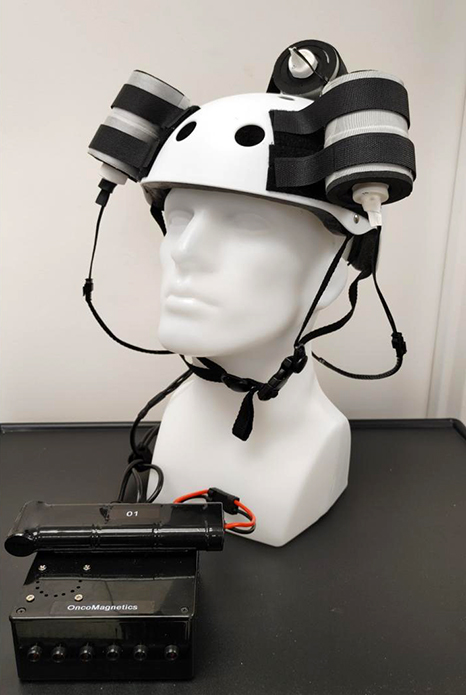
At the Houston Methodist Neurological Institute, researchers have developed a device that generates a magnetic field and used it to successfully shrink a glioblastoma tumor in a patient volunteer. The device is worn on the head each day during treatment, and uses an oscillating magnetic field to disrupt biochemical processes in cancer cells. While the technique is in its infancy, this first-in-human test of this particular type of device shows promise, and could herald the first steps in a new non-invasive treatment modality.
Glioblastoma is a brain cancer with a very poor prognosis, and which nearly always proves fatal. Patients typically live from a couple of months to approximately two years following a diagnosis. There is a need for new treatments that can improve the prognosis for this patient population. This latest technology uses an oscillating magnetic field to shrink tumors, and may be useful in glioblastoma.
It may seem strange that a magnetic field would kill cancer cells. For this particular device, this is thought to occur through disruption of electron transport during mitochondrial respiration, leading to an increase in reactive oxygen species and eventual cancer cell death. As cancer cells tend to be more metabolically active than healthy cells, oscillating magnetic fields may exert a simple selectivity for tumors.
The magnetic fields can be applied through a wearable headset, which helps to ensure that the treatment is localized near a glioblastoma tumor, and also means that patients can administer the therapy themselves in the home. The device consists of three oscillators attached to a helmet. In this first-in-human test of the new device, a 53 year old glioblastoma patient used the device regularly. Unfortunately, the patient died after a month of treatment from an unrelated injury. His family kindly agreed to an autopsy so that the researchers could discover how effective the treatment had been.
“Thanks to the courage of this patient and his family, we were able to test and verify the potential effectiveness of the first noninvasive therapy for glioblastoma in the world,” said David S. Baskin, a researcher involved in the study. “The family’s generous agreement to allow an autopsy after their loved ones’ untimely death made an invaluable contribution to the further study and development of this potentially powerful therapy.”
Strikingly, the researchers found that the treatment had shrunk the tumor by 31%, suggesting that it may be a viable non-invasive treatment option for glioblastoma patients. “Imagine treating brain cancer without radiation therapy or chemotherapy,” said Baskin. “Our results in the laboratory and with this patient open a new world of non-invasive and nontoxic therapy for brain cancer, with many exciting possibilities for the future.”
Study in Frontiers in Oncology: Case Report: End-Stage Recurrent Glioblastoma Treated With a New Noninvasive Non-Contact Oncomagnetic Device
